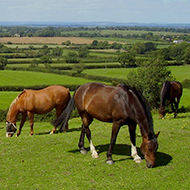
Organisations offer free emergency plan and daily webinars
The British Horse Society (BHS) and The University of Nottingham are asking all horse owners to make a pledge during Colic Awareness Week 2020, which runs from 5-11 October.
This year the BHS and The University of Nottingham’s School of Veterinary Medicine and Science are providing free daily 10-minute webinars, focusing on various colic-related subjects. They will also be sharing advice and guidance on social media, using the hashtag #ColicAwarenessWeek.
Additionally, horse owners can sign up to receive a free equine care and emergency plan, to help them recognise warning signs early on and understand what to do in an emergency before the situation arises.
Veterinary practices that are a part of the ‘Vet REACT Colic Champions scheme’ will also be sharing information with clients across the week - both in practice and on social media - to help raise awareness.
Dr Katie Lightfoot, teaching associate in equine welfare at The University of Nottingham’s School of Veterinary Medicine and Science, said: “We are delighted to be continuing our collaboration with The British Horse Society to improve the health and welfare of the horse.
“The School of Veterinary Medicine and Science have continued our research into colic and emergency planning which underpins this educational campaign. Colic awareness week gives us a fantastic opportunity to share the evidence-based information as widely as possible within the horse community.”
To view the previous webinars and watch the remainder that will be hosted this week, please visit the BHS’ Facebook page.



 The Federation of Independent Veterinary Practices (FIVP) has announced a third season of its podcast, Practice Matters.
The Federation of Independent Veterinary Practices (FIVP) has announced a third season of its podcast, Practice Matters.